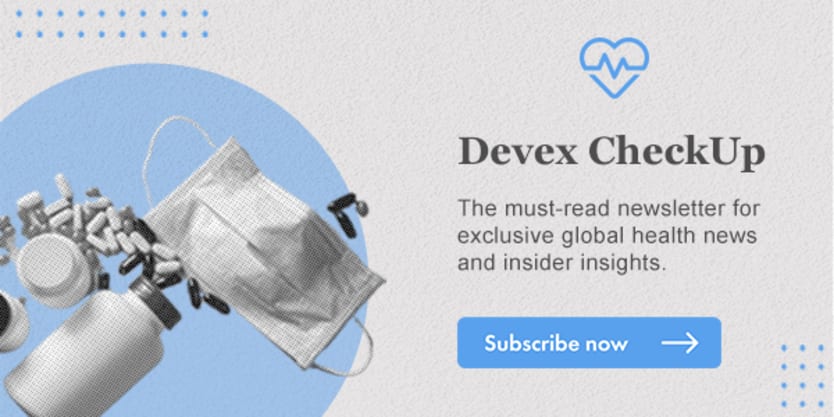
On May 12, the Group of 7 leading industrial nations and the larger Group of 20 countries will gather virtually for the second Global COVID-19 Summit, where leaders must recognize that the business-as-usual approach will not only fail to address severe vaccine inequity now, but will potentially exacerbate existing health inequity for future pandemics.
The must-read weekly newsletter for exclusive global health news and insider insights.
The first summit in September 2021 concluded with optimism with new, increased commitments across three themes: vaccinating the world, saving lives now, and building better health security. Countries promised to donate more vaccines, provide treatment and testing support, and ramp up vaccine manufacturing at domestic and regional facilities.
Yet, more than two years into the pandemic, at least one of those goals — vaccinating the world — is still far out of reach. While the United States and the European Union sought to vaccinate 70% of every country by September 2022, low-income countries, on average, are only 12% fully vaccinated, and lower-middle income countries hovering above 50%.
Moreover, despite a long battle for a temporary waiver of certain provisions in the World Trade Organization’s agreement on Trade-Related Aspects of Intellectual Property Rights, or TRIPS, there is still no global consensus that would allow firms to produce generic equivalents of key vaccines, even during a pandemic. The most recent TRIPS “compromise” has failed to captivate any of the parties involved except WTO Director-General Ngozi Okonjo-Iweala, who sees the compromise as a way forward for the beleaguered institution.
The international response to COVID-19 faces a glaring pitfall: by donating more vaccine doses, and not addressing low demand, wealthy countries are undermining their own goals.
—One obstacle that has gained a lot of attention in recent weeks is the problem of waning demand for vaccines — especially in African countries. Some blame African vaccine hesitancy, rooted in public misinformation, government mistrust, or the sense that other health threats trump COVID-19 in imminence or severity. Others blame the lack of infrastructure and health care workers to deliver and administer vaccines, or point to inconsistent and delayed deliveries of donated doses, making it impossible for countries to adequately plan vaccination campaigns.
Unsurprisingly, this reality has created a new hurdle for both the near-term goal of getting shots in arms, and the long-term goal of building health sector resiliency, which is vital for future pandemic preparedness.
Observe, for example, Aspen Pharmacare, a South African company that negotiated a voluntary license from Johnson & Johnson to produce its vaccine under the branded generic name, Aspenovax. Since Aspen began production last December, it has received no orders from African countries, and as a result, may have to close. Dr. John Nkengasong, director of Africa Centres for Disease Control and Prevention, has called on international institutions such as COVAX and others to purchase vaccines from Aspen to support Africa’s long-term health security.
The international response to COVID-19 faces a glaring pitfall: by donating more vaccine doses, and not addressing low demand, wealthy countries are undermining their own goals of building up local and regional infrastructure for pharmaceutical manufacturing by out-competing those industries. Put simply, companies such as Aspen shouldn't be in competition with foreign firms, but enabled to fully enter the supply chain and fill vaccine gaps.
As we witness yet another surge in cases around the world, this new summit must be different.
First, G-7 and G-20 country leaders must consider how their commitments interact with each other, taking steps to mitigate the interference. They must prioritize reducing the practical obstacles to local vaccine demand in the lowest-income countries, by increasing transparency and consistency in the doses that they donate, while financing efforts to boost demand through local outreach, improving storage and distribution infrastructure, and other economic supports.
Second, G-7 and G-20 leaders, together with institutions such as COVAX, must help increase global demand by purchasing vaccines from Aspen and other new pharmaceutical manufacturers — deliberately supporting African manufacturing. If these firms are not adequately supported, all the effort to create a more equitably distributed supply chain will have been lost and the world will have to overcome the same obstacles in the next pandemic.
Finally, G-7 and G-20 leaders should support health care resiliency and security globally over the short and long term by agreeing to a comprehensive TRIPS waiver that protects low- and middle-income countries and their firms from international disputes over intellectual property rights and effectively transfer knowledge and technology for new production. These countries must lead in an effort “to expand … vaccine manufacturing capacity … to make vaccine production and distribution more predictable and coordinated.”
This will not happen by maintaining the status quo of international IP rules, which recent research has demonstrated consistently reduces access to essential medicines.
As Dr. Tedros Adhanom Ghebreyesus urged at the initial summit, G-7 and G-20 countries must build better governance, financing, systems, and tools to ensure global health security. Ending this pandemic and protecting ourselves from future health crises depends on it.



